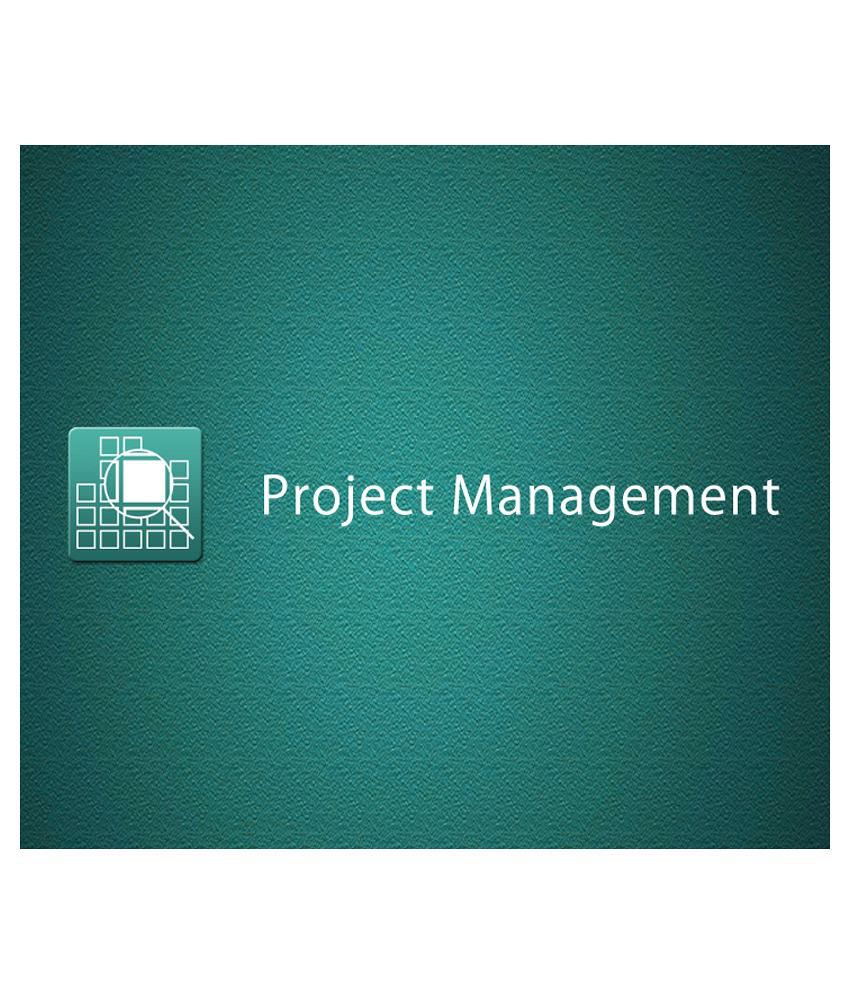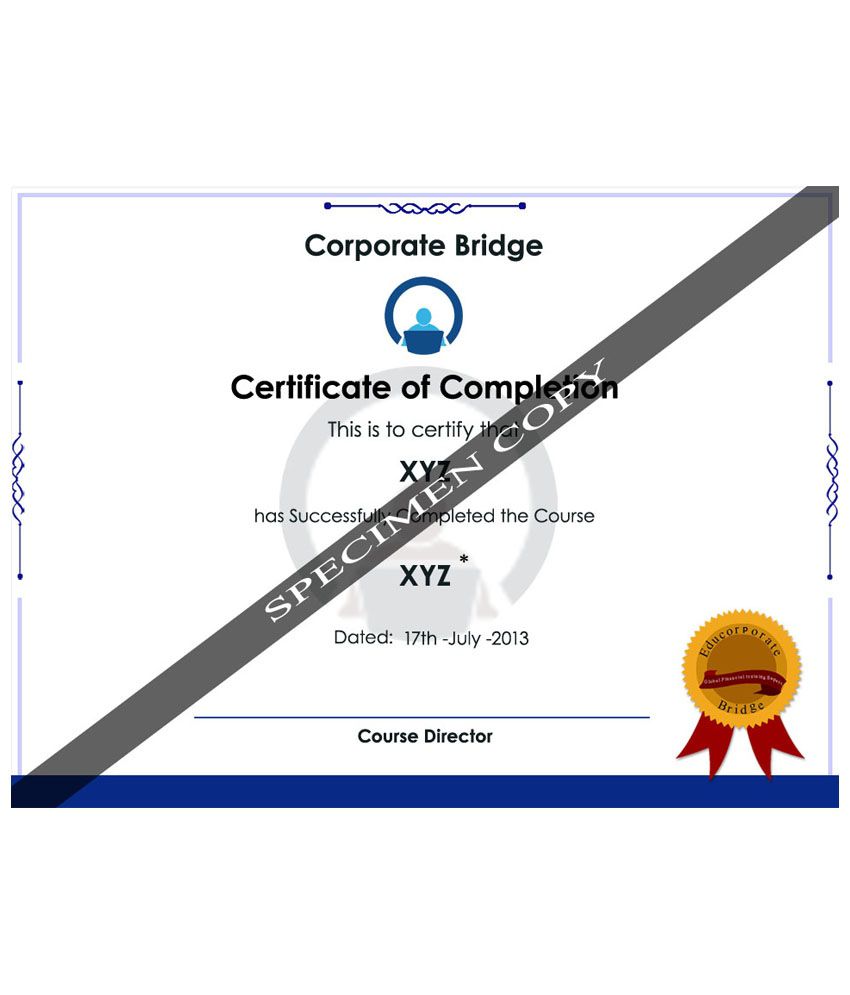![]()
Syste
m (Hardware/Software)
Requirements
| Operating
Software | Windows XP or
Higher
| | Processor | Minim
um P4 or Higher
| | RAM | 1 GB or
Higher
| | Browser | Any
| | Recommended Internet
Speed | Minimum 1MBPS
| | Supported Browser
Plug-ins | * Updated
Flash Player, * Update Java
| | Other
Requirements | Speaker or
headphone | |
Prdocut DescriptionProject Management is one of the fastest growing professions in the world - as such, certified Project Managers are some of the most sought after professionals in the world! Whether you're new to the project management field or an experienced PMP, we'll help you hone your skills to effectively communicate your project vision, keep tasks on track, remain agile to change, deliver quality outcomes, and foster a winning team.
This world-class course will help Project Managers translate the International Standard for Project Management into real-world technologies and real-world applications. Project Managers will review the entire Project Management process from beginning to end, and improve their skills in major areas of focus. Students will also learn from real-world issues, develop action plans, and learn Project Management best practices.
Tricks of the Tradefor Project Management is designed for experienced project and junior project managers, PMO managers and senior managers looking to acquire a firm grasp of specific steps in the Project Management process-or of the entire process from beginning to end. In addition, because this course teaches students how to apply International Project Management standards in the real world, it can be taken as additional prep for people looking to earn a Project Management Professional (PMP) Certification.
At the conclusion of this course, students will be able to:
1.Understand the Project Management Process from beginning to end.
2.More effectively manage projects within their organization.
3.Use common Project Management terminology.
4.Apply real-world techniques and proven Tricks of the Tradeto projects.
5.Deliver and manage benefits better.
Course Curriculum
Section1:Project Management
Lecture1:Introduction
Lecture2:Project Management Characteristics
Lecture3:Project Management Life Cycle and Phases
Section2:Process Groups & Knowledge Areas
Lecture4:Process Groups & Knowledge Areas
Lecture5:Different Process Groups
Lecture6:Different Process Groups & Knowledge Areas
Lecture7:Project Integration Management
Lecture8:Scope
Lecture9:Cost and Quality
Lecture10:Cost and Quality Continues
Lecture11:Triple Constraints & Communications
Lecture12:Tripple Constraints and Communications
Lecture13:Risk Management
Lecture14:Procurement Management
Lecture15:Stakeholder Management
Lecture16:Stake Holder Management Continues
Lecture17:Project Human resource Management
Lecture18:Human Resource Management Continues
Section3:Project Integration Management
Lecture19:Project Integration Management Processes
Lecture20:Develop Project Charters
Lecture21:Develop Project Charters - Inputs
Lecture22:Develop Project Charters - Tools and Techniques, Output
Lecture23:Develop Project Management Plan, Inputs
Lecture24:Develop Project Management Plan - Tools and Techniques, Output
Lecture25:Direct and Manage the Project Work
Lecture26:Direct and Manage the Project Work - Inputs, Tools and Techniques
Lecture27:Direct and Manage the Project Work - Outputs
Lecture28:Monitor and Control Project Work
Lecture29:Monitor and Control Project Work - Process Charts
Lecture30:Perform Integrated Change Control
Lecture31:Perform Integrated Change Control - Process Charts
Lecture32:Close Project or Phase
Section4:Project Scope Management
Lecture33:Introduction
Lecture34:Project Scope Management Processes
Lecture35:Plan Scope Management - Inputs
Lecture36:Plan Scope Management - Tools and Techniques
Lecture37:Plan Scope Management - Outputs
Lecture38:Plan Scope Management - Outputs Continues
Lecture39:Collect Requirements
Lecture40:Collect Requirements Continues
Lecture41:Collect Requirements - Inputs
Lecture42:Collect Requirements - Inputs Continues
Lecture43:T&T - Interviews
Lecture44:T&T - Focus Group
Lecture45:T&T - Group Creativity Techniques
Lecture46:T&T - Group Creativity Techniques Continues
Lecture47:Affinity Diagram
Lecture48:Collect Requirements - Tools and Techniques
Lecture49:Value Analysis
Lecture50:Context Diagram, Document Analysis
Lecture51:Define Scope Part 1
Lecture52:Define Scope Part 2
Lecture53:Define Scope - Process Charts
Lecture54:Define Scope - Inputs
Lecture55:Define Scope - Tools and Techniques
Lecture56:Define Scope - Outputs
Lecture57:Create WBS Part 1
Lecture58:Create WBS Part 2
Lecture59:Create WBS - Process Charts
Lecture60:Create WBS - Tools and Techniques
Lecture61:Validate Scope
Lecture62:Validate Scope - Process Charts
Lecture63:Validate Scope - Inputs
Lecture64:Validate Scope - Outputs
Lecture65:Control Scope - Process Chart
Lecture66:Control Scope - T&T, Outputs
Section5:Project Time Management
Lecture67:Introduction
Lecture68:Plan Schedule Management
Lecture69:Plan Schedule Management - Output
Lecture70:Plan Schedule Management - Tools and Techniques
Lecture71:Plan Schedule Management - Output
Lecture72:Define Activities
Lecture73:Define Activities - Tools and Techniques
Lecture74:Project Time Management Part 8
Lecture75:Define Activities - Tools and Techniques
Lecture76:Define Activities - Outputs
Lecture77:Sequence Actvities
Lecture78:Sequence Activities - Inputs
Lecture79:Sequence Activities - Tools and Techniques
Lecture80:Tools and Techniques - PDM Method
Lecture81:Tools and Techniques - PDM Method Continues
Lecture82:Tools and Techniques- Dependency Determination
Lecture83:Tools and Techniques- Leads and Lags
Lecture84:Sequence Activities - Outputs - Project Schedule Diagram Networks
Lecture85:Sequence Activities - Outputs
Lecture86:Estimate Activity Resources
Lecture87:Estimate Activity Resources - Process Charts
Lecture88:Estimate Activity Resources - Inputs
Lecture89:Estimate Activity Resources - Tools and Techniques
Lecture90:Estimate Activity Resources - Tools and Techniques, Outputs
Lecture91:Estimate Activity Duration
Lecture92:Estimate Activity Duration - Process Chart
Lecture93:Estimate Activity Duration - Inputs
Lecture94:Estimate Activity Duration - Tools and Techniques
Lecture95:Tools and Techniques - Analog Estimating
Lecture96:Tools and Techniques - Three Point Estimating
Lecture97:Tools and Techniques - Three Point Estimating Continues
Lecture98:Tools and Techniques - Reserve Analysis, Outputs
Lecture99:Develop Schedule
Lecture100:Develop Schedule - Process Chart
Lecture101:Develop Schedule - Inputs
Lecture102:Inputs - Activity Resource Requirements
Lecture103:Inputs - Project Staff Assignment, RBS
Lecture104:Develop Schedule - Tools and Techniques
Lecture105:Tools and Techniques - Critical Path Method
Lecture106:Critical Path Method Continues
Lecture107:Critical Path Method - Critical Path Analysis
Lecture108:Critical Path Method - Float Determination
Lecture109:Float Determination Continues
Lecture110:Critical Path Method - Early Start and Early Finish
Lecture111:Critical Path Method - Late Start and Late Finish
Lecture112:Late Start and Late Finish Continues
Lecture113:Late Start Late Finish Calculations
Lecture114:Critical Path Method - AOA
Lecture115:Critical Chain Method
Lecture116:How Critical Chain Method works?
Lecture117:Tools and Techniques - Resource Optimization Techniques
Lecture118:Leads and Lags, Schedule Compression
Lecture119:Crashing
Lecture120:Crashing Example
Lecture121:Revisiting the Develop Schedule Process Chart
Lecture122:Develop Schedule - Outputs
Lecture123:Outputs - Bar Charts, Gantt Charts
Lecture124:Outputs - Project Schedule Network Diagrams
Lecture125:Control Schedule
Lecture126:Control Schedule - Inputs, Tools and Techniques
Lecture127:Control Schedule - Tools and Techniques, Outputs
Benefits
eduCBA e-campus
Virtual campus powered by robust LMS which enables to study through internet with cutting edge features
Online Video Training Material
Presentation Slides
USP of the product
* 24 x 7 online access* Learn from tutorials curated by expert industry professionals and trainers* Certificate of Completion* Practical application oriented skillsHow to use? (Steps to use Study Material)
Step 1 - eduCBA sends the redemption coupon along with the registration link. Step 2 - Student will register with his register email id and coupon Step 3 - Student receive the course access and password on his/her email idStep 4 - Login using your email id and password and start learningTo get more information, you may want to watch the video below
Learn Everything, Anywhere, Anytime
India's Largest Online Education Marketplace



